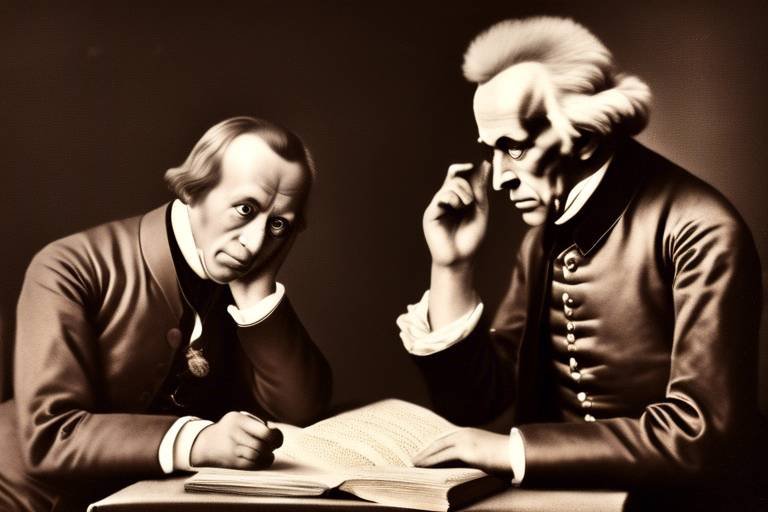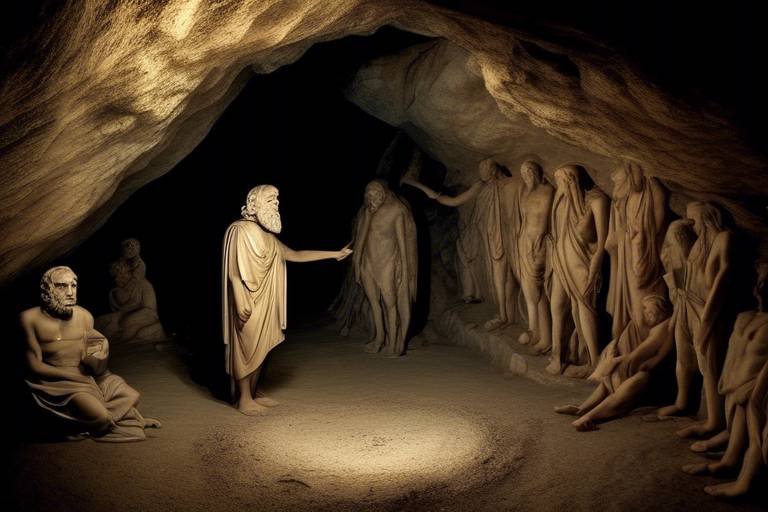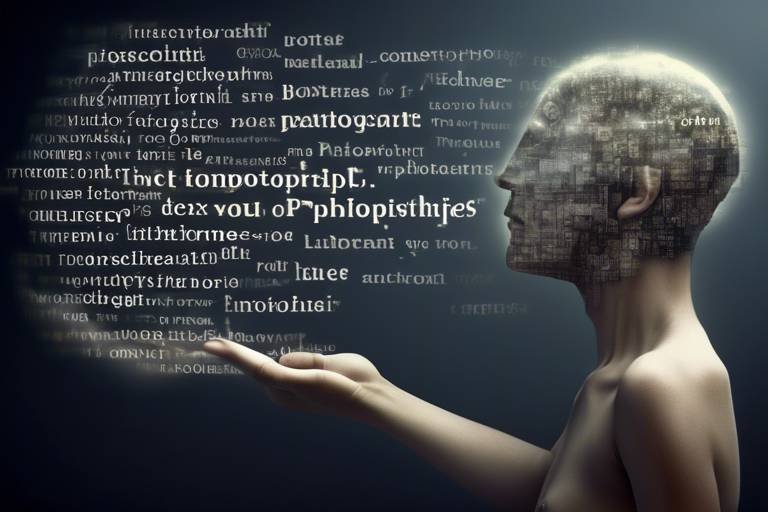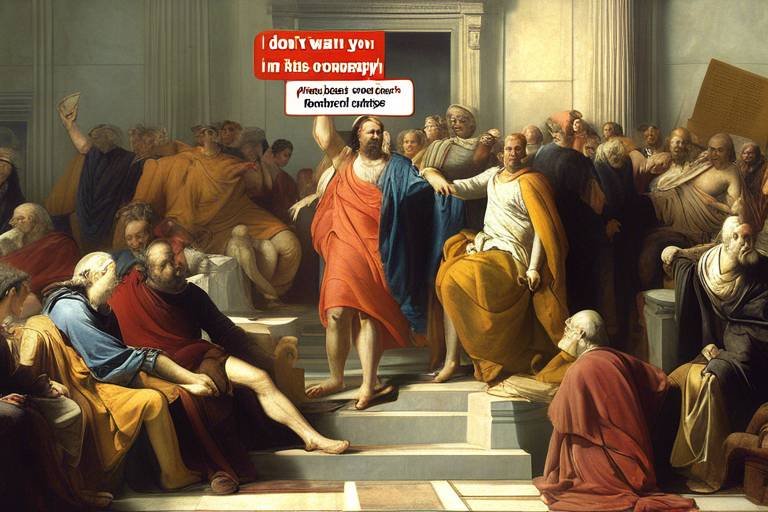Examining Rationalism through Kant's Philosophy
Rationalism, a cornerstone of philosophical inquiry, is a fascinating domain that has shaped our understanding of knowledge and existence. Among the luminaries of this tradition, Immanuel Kant stands out as a pivotal figure whose contributions have left an indelible mark on modern thought. This article delves into Kant's contributions to rationalism, exploring his key ideas, critiques, and the lasting impact of his philosophy on modern thought and epistemology.
Kant's rationalism is rooted in the belief that reason is the primary source of knowledge. Unlike empiricists, who argue that knowledge comes solely from sensory experience, Kant posits that our understanding of the world is inherently structured by the faculties of our mind. This revolutionary perspective is encapsulated in his claim that while experience provides the content of knowledge, it is reason that shapes and organizes this content into coherent understanding. Kant's philosophy asserts that certain concepts and principles are innate to human cognition, allowing us to make sense of our experiences.
In the philosophical arena, the clash between empiricism and rationalism is a longstanding debate. Kant's philosophy presents a critical response to empiricism, offering a synthesis that reconciles both schools of thought. He argues that while empirical data is essential, it is not sufficient for the acquisition of knowledge. For Kant, reason plays a vital role in interpreting and organizing these experiences into a structured understanding of reality. This reconciliation leads to profound implications for knowledge acquisition, suggesting that our cognitive faculties actively shape our perceptions rather than passively receiving information.
A priori knowledge is central to Kant's rationalism. This type of knowledge is independent of experience and serves as a foundation for understanding the world. Kant argues that certain truths, such as mathematical principles and fundamental concepts of space and time, are known innately. This innate knowledge allows us to engage with the world meaningfully, as it provides the necessary framework for interpreting sensory experiences. For instance, the statement "2 + 2 4" holds true regardless of any empirical evidence, illustrating the power of a priori knowledge in shaping our understanding.
Kant introduces a series of categories that structure human experience. These categories, such as causality, unity, and plurality, are not derived from experience but are essential for making sense of it. They serve as the lenses through which we perceive reality, influencing how we interpret events and phenomena. Without these categories, our experiences would be chaotic and unintelligible. Kant's assertion that these categories are inherent to human cognition highlights the active role of the mind in knowledge formation.
In his exploration of knowledge formation, Kant makes a crucial distinction between intuition and sensibility. Intuition refers to the immediate, direct awareness of objects, while sensibility pertains to our capacity to receive sensory data. According to Kant, both elements are integral to knowledge acquisition. Our intuitions provide the raw data of experience, which our sensibility then processes through the categories of understanding. This interplay between intuition and sensibility exemplifies the dynamic nature of human cognition, wherein our perceptions are continually shaped and reshaped by our rational faculties.
In his seminal work, Critique of Pure Reason, Kant critiques traditional notions of knowledge, challenging the empiricist view that knowledge arises solely from sensory experience. He argues that while empirical observations are valuable, they cannot account for the full scope of human understanding. Kant's key arguments assert that our knowledge is shaped by a priori concepts and that the limitations of human cognition necessitate a careful examination of what we can truly know. This critique has profound implications for epistemology, prompting a reevaluation of the foundations of knowledge itself.
Kant's ideas have profoundly influenced contemporary philosophy, paving the way for a new understanding of rationalism. His critiques and theories have inspired a multitude of thinkers who have built upon his foundation, leading to the evolution of rationalist thought into new domains. From existentialism to phenomenology, Kant's impact is evident in the way modern philosophers grapple with questions of knowledge, reality, and existence.
Kant's contributions to epistemology remain significant, shaping discussions around knowledge and belief in modern philosophy. His insistence on the interplay between reason and experience has led to a more nuanced understanding of how we acquire knowledge. Today, scholars continue to explore the implications of Kantian rationalism, examining how his ideas resonate within contemporary debates about the nature of truth and belief.
Moreover, Kant's rationalism extends into ethics, where he argues that moral principles are grounded in reason. His moral philosophy reflects rationalist principles, positing that ethical truths are universally applicable and can be discerned through rational deliberation. This approach has significant implications for ethical theory, emphasizing the role of reason in moral decision-making and the pursuit of the good life.
- What is Kant's main contribution to rationalism? Kant's main contribution is the idea that reason is the primary source of knowledge, which challenges the empiricist perspective.
- How does Kant reconcile empiricism and rationalism? Kant reconciles these views by asserting that while knowledge begins with experience, it is shaped by a priori concepts inherent in human cognition.
- What is a priori knowledge? A priori knowledge is knowledge that is independent of experience, such as mathematical truths.
- What impact did Kant have on modern philosophy? Kant's ideas have profoundly influenced various philosophical movements, including existentialism and phenomenology.

The Foundations of Kantian Rationalism
Kant's rationalism is a fascinating exploration of the ways in which human beings acquire knowledge. At its core, Kantian rationalism posits that reason is the primary source of knowledge, standing in contrast to the empiricist view that emphasizes sensory experience. This foundational belief leads to a rich tapestry of ideas that not only challenge previous philosophical norms but also lay the groundwork for modern epistemology. Kant believed that while our experiences are crucial, they are not the sole determinants of our understanding. Instead, he argued that our minds actively shape and organize these experiences through inherent structures.
One of the most crucial elements of Kant's philosophy is the concept of a priori knowledge. This type of knowledge is independent of experience and is essential for understanding the world around us. Kant argues that certain concepts, like space and time, are not derived from experience but rather are innate frameworks through which we interpret our experiences. To illustrate this, consider how we perceive a triangle: we can understand the concept of a triangle without needing to see one physically. This innate understanding is what Kant refers to as a priori knowledge, which forms the basis of our rationalist approach.
Moreover, Kant introduces the idea of categories of understanding, which are innate conceptual tools that help us make sense of our experiences. These categories include concepts like causality, unity, and plurality. They are not learned through experience but are rather pre-existing structures in our mind that allow us to process and interpret sensory data. For instance, when we observe a series of events, our mind automatically applies the category of causality to understand that one event leads to another. This automatic processing is vital to how we navigate the complexities of reality.
In addition to categories, Kant differentiates between intuition and sensibility. Intuition refers to our immediate perception of objects, while sensibility is the capacity to receive sensory input. Kant argues that knowledge formation is a blend of these two elements. For example, when we see a tree, our intuition gives us the immediate perception of its shape and color, while our sensibility allows us to experience it through our senses. This interplay is crucial in Kant's rationalist framework, as it highlights the active role our minds play in shaping our understanding of the world.
Ultimately, the foundations of Kantian rationalism challenge us to reconsider the sources of our knowledge. By emphasizing the role of reason and innate structures, Kant provides a compelling argument for a more nuanced understanding of human cognition. His ideas encourage us to explore the intricate relationship between our experiences and the mental frameworks that shape them. As we dive deeper into Kant's philosophy, we uncover a rich landscape of thought that continues to resonate in contemporary discussions about knowledge and belief.

Empiricism vs. Rationalism
When we dive into the philosophical waters of empiricism and rationalism, we find ourselves navigating some of the most profound questions about how we acquire knowledge. At the heart of this debate lies a fundamental disagreement: is knowledge primarily derived from experience, or is it rooted in reason? Empiricists, like John Locke and David Hume, argue that all knowledge comes from sensory experience. They posit that we are born as a blank slate, and our understanding of the world is shaped through our interactions with it. In contrast, rationalists, including Kant, assert that there are innate structures within our minds that allow us to comprehend the world independently of our sensory experiences.
Kant's approach to this debate is particularly fascinating. He doesn't simply choose one side or the other; instead, he seeks to reconcile the two. He acknowledges that while experience is essential, our understanding of that experience is filtered through our rational faculties. This leads us to a critical question: Can we ever have knowledge that is truly independent of experience? According to Kant, the answer lies in his concept of a priori knowledge, which refers to knowledge that is gained independently of experience. This knowledge forms the basis for our understanding of the world, allowing us to make sense of our experiences in a structured way.
To illustrate this further, consider the following table that summarizes the key differences between empiricism and rationalism:
| Aspect | Empiricism | Rationalism |
|---|---|---|
| Source of Knowledge | Experience and sensory data | Reason and innate ideas |
| View of Human Mind | Tabula rasa (blank slate) | Structured by innate concepts |
| Key Figures | John Locke, David Hume | René Descartes, Immanuel Kant |
Kant introduces a fascinating twist to this discourse through his concept of categories of understanding. He argues that our minds possess innate categories that shape how we perceive and interpret the world. These categories—such as causality, unity, and plurality—act as filters through which we process sensory information. Without these categories, Kant believes we would be overwhelmed by the chaos of raw data, unable to make sense of our experiences. This leads to another thought-provoking question: Are our perceptions of reality shaped more by our experiences or by the inherent structures of our minds?
Kant's distinction between intuition and sensibility further enriches this discussion. Intuition refers to the immediate, non-conceptual awareness of objects, while sensibility involves the capacity to receive sensory input. Kant suggests that both are essential for knowledge formation. For instance, when you see a tree, your sensibility allows you to perceive it, but your intuition helps you understand its existence as an object in space. This interplay between intuition and sensibility is crucial for grasping how we come to know anything at all.
Ultimately, the clash between empiricism and rationalism is not merely academic; it has real-world implications for how we understand science, ethics, and even our daily lives. As we continue to explore these philosophical landscapes, we must ask ourselves: What role does our innate reasoning play in shaping our experiences, and how does that influence our pursuit of knowledge? By examining Kant's contributions to this debate, we gain valuable insights into the nature of human understanding and the ongoing quest for truth.
- What is the main difference between empiricism and rationalism? Empiricism emphasizes knowledge through sensory experience, while rationalism focuses on knowledge through reason and innate ideas.
- How does Kant reconcile empiricism and rationalism? Kant believes that while experience is essential, our understanding is shaped by innate categories of the mind, allowing for knowledge that is independent of direct experience.
- What is a priori knowledge? A priori knowledge is knowledge that is gained independently of experience, forming the foundation for our understanding of the world.

The Role of A Priori Knowledge
A priori knowledge, a central tenet of Kant's philosophy, refers to knowledge that is independent of experience. In simpler terms, it's the kind of knowledge we can grasp without having to rely on our senses. Think of it as the foundation upon which we build our understanding of the world. Kant believed that certain concepts, such as space and time, are innate structures of the mind that help us make sense of our experiences. This notion challenges the traditional empiricist view, which posits that all knowledge arises from sensory experience. Kant's innovative approach suggests that while our experiences inform our understanding, there are fundamental truths we can know without them.
To illustrate the significance of a priori knowledge, consider mathematical truths. For instance, the statement "2 + 2 4" holds true regardless of whether we have ever counted objects physically. This type of knowledge is universal and necessary, forming the backbone of rational thought. Kant categorized a priori knowledge into two main types: pure a priori knowledge, which is knowledge that is completely independent of any experience, and empirical a priori knowledge, which might involve some experiential component but still retains its a priori nature. The interplay between these forms is crucial for understanding Kant's epistemology.
Moreover, a priori knowledge sets the stage for our ability to engage with the world critically. Kant argued that our minds actively shape our experiences through these inherent structures. Without a priori knowledge, we would be left with a chaotic stream of sensory data, unable to make sense of anything. This leads us to the idea that our understanding of reality is not merely passive but actively constructed. Kant's revolutionary assertion was that while we learn from experience, the categories of understanding—such as causality and unity—are pre-existing frameworks that allow us to interpret our experiences meaningfully.
In essence, a priori knowledge is like the software that runs on the hardware of our minds. It enables us to process information, make judgments, and derive conclusions that transcend mere empirical observation. This foundational aspect of Kant's thought has far-reaching implications, not only in philosophy but also in fields like mathematics, science, and ethics, where understanding the underlying principles is essential for meaningful inquiry.
In conclusion, Kant's emphasis on a priori knowledge marks a significant departure from empiricist thought. By asserting that certain truths are inherent to human cognition, Kant opened the door to a more profound exploration of how we acquire knowledge. This exploration continues to resonate in modern philosophical discourse, as thinkers grapple with the implications of his ideas for our understanding of reality and the nature of knowledge itself.
- What is a priori knowledge? A priori knowledge is knowledge that is independent of experience, such as mathematical truths and logical deductions.
- How does Kant differentiate between a priori and a posteriori knowledge? A priori knowledge is known without experience, while a posteriori knowledge is derived from sensory experience.
- Why is a priori knowledge important in Kant's philosophy? It serves as the foundation for understanding how we perceive and interpret the world, shaping our knowledge and experiences.
- Can a priori knowledge exist without experience? Yes, according to Kant, certain truths can be known independently of any sensory experience.

Categories of Understanding
Kant's exploration of the is a cornerstone of his philosophical framework. He proposed that our experience of the world is not merely a passive reception of sensory data; rather, it is actively structured by these innate categories. Think of these categories as the lenses through which we interpret reality. Just as a photographer uses different filters to capture various aspects of a scene, our minds utilize these categories to make sense of the information we receive.
According to Kant, there are twelve fundamental categories that shape our understanding, which can be grouped into four main types:
| Type | Categories |
|---|---|
| Quantity | Unity, Plurality, Totality |
| Quality | Reality, Negation, Limitation |
| Relation | Inherence and Subsistence (substance and accident), Causality and Dependence (cause and effect), Community (reciprocal action or interaction) |
| Modality | Possibility, Existence, Necessity |
These categories are not derived from experience but are instead a priori concepts that the mind uses to organize sensory input. For example, when we perceive an object, we inherently categorize it as a singular entity (unity), and we recognize its properties (reality) based on our prior knowledge. This active engagement with the world allows us to form coherent experiences and knowledge.
Furthermore, Kant argued that without these categories, our perceptions would be chaotic and unintelligible. Imagine trying to read a book with the words jumbled up; without a clear structure, it would be impossible to grasp the meaning. Similarly, the categories provide a necessary framework that enables us to understand the complex tapestry of our experiences.
In essence, Kant's categories of understanding highlight the interplay between our cognitive faculties and the external world. They illustrate how our minds construct knowledge, emphasizing that while we may receive information through our senses, it is our innate categories that ultimately shape our comprehension of reality.
- What are Kant's categories of understanding? They are innate concepts that structure our experiences and perceptions, allowing us to make sense of the world.
- How many categories did Kant identify? Kant identified twelve categories, grouped into four types: Quantity, Quality, Relation, and Modality.
- Why are these categories important? They provide a necessary framework for organizing sensory information, making our experiences coherent and intelligible.
- Are the categories learned from experience? No, they are considered a priori concepts, meaning they exist independently of experience.

Intuition and Sensibility
In the intricate tapestry of Kant's philosophy, the concepts of intuition and sensibility play pivotal roles in shaping our understanding of knowledge. Kant draws a clear distinction between these two faculties, suggesting that they are essential for the formation of our experiences. Think of intuition as the immediate grasp of phenomena, akin to catching a whiff of your favorite dish before you even see it. It’s that instant recognition that something exists, while sensibility is more about how we perceive that existence through our senses—like tasting that dish and savoring its flavors.
Kant posits that all knowledge begins with intuitions, which are the raw data of experience. These intuitions, however, are not mere passive receptions; they require the active engagement of our sensibility. To put it simply, without sensibility, intuition would be like a blank canvas—beautiful but devoid of any form or meaning. Kant argues that our senses provide the necessary framework to interpret and organize these intuitions, allowing us to construct a coherent understanding of the world around us.
To illustrate this further, consider how we experience a sunset. Our intuition allows us to perceive the colors and the light, while our sensibility enables us to feel the cool breeze, hear the rustling leaves, and even smell the fresh evening air. Together, these faculties create a rich tapestry of experience that informs our knowledge. Kant emphasizes that both intuition and sensibility are not just passive receivers of information; they actively shape how we understand and interact with the world.
Moreover, Kant categorizes intuitions into two primary forms: space and time. These forms are not learned from experience but are inherent structures of our mind that allow us to make sense of our sensory experiences. They serve as the lenses through which we view the world, framing our perceptions in a way that is both organized and comprehensible. Without these forms, our experiences would be chaotic and unintelligible.
In summary, the interplay between intuition and sensibility is central to Kant's epistemology. It highlights how our minds are not mere passive observers but active participants in the process of knowledge acquisition. This dynamic relationship ensures that our understanding of reality is both immediate and profound, allowing us to navigate the complexities of existence with a clearer perspective.
- What is the difference between intuition and sensibility in Kant's philosophy?
Intuition refers to the immediate awareness of phenomena, while sensibility involves the sensory perception that gives meaning to those intuitions. - How do intuition and sensibility contribute to knowledge?
Intuition provides the raw data of experience, and sensibility organizes and interprets that data, allowing us to form coherent knowledge. - Why are space and time important in Kant's epistemology?
Space and time are the inherent forms of intuition that structure our experiences, making it possible for us to understand and relate to the world.

Critique of Pure Reason
Immanuel Kant's is a seminal work that revolutionized the landscape of philosophy. Published in 1781, this profound text examines the limitations and scope of human understanding. Kant challenges the prevailing notions of knowledge by asserting that our experiences are shaped not just by the external world but also by the innate structures of our mind. In essence, he argues that while we can gain knowledge through experience, there are fundamental concepts that exist a priori, independent of sensory experience.
One of the central themes of the Critique is the distinction between analytical and synthesizing judgments. Analytical judgments are those where the predicate is contained within the subject, such as "All bachelors are unmarried." Conversely, synthesizing judgments expand our knowledge by connecting concepts that are not inherently linked, like "The cat is on the mat." Kant posits that our understanding of the world is largely dependent on these synthesizing judgments, which are facilitated by the categories of understanding he introduces.
Kant meticulously critiques the empiricist perspective, which asserts that knowledge arises solely from sensory experience. He contends that while empirical data is crucial, it is insufficient for a comprehensive understanding of reality. Instead, he proposes that our perception is filtered through innate categories such as causality, unity, and plurality, which shape and structure our experiences. This revolutionary idea leads us to consider the mind not as a passive receiver of information but as an active participant in constructing knowledge.
In the , Kant also introduces the concept of the transcendental, which refers to the conditions that make knowledge possible. He argues that there are certain necessary conditions for experiencing the world, such as space and time, which are not derived from experience but rather are the lenses through which we interpret our experiences. This perspective radically shifts the focus of epistemology from the external world to the internal structures of the mind.
To further illustrate his arguments, Kant employs a series of thought experiments and analogies. For instance, he compares the mind to a lens that focuses light. Just as a lens shapes the light that passes through it, our mental categories shape our perception of reality. This metaphor emphasizes the active role of the mind in interpreting sensory data, suggesting that knowledge is not merely a reflection of the external world but a complex interplay between perception and cognition.
Ultimately, the serves as a bridge between rationalism and empiricism, illustrating that both reason and experience are essential to understanding knowledge. Kant's work invites readers to reconsider their assumptions about how we come to know what we know, prompting profound questions about the nature of reality and our place within it. In doing so, he lays the groundwork for subsequent philosophical inquiry and significantly influences modern epistemology.

Critique of Pure Reason
Kant's rationalism is rooted in the belief that reason is the primary source of knowledge. This section examines the foundational principles that underlie his philosophical approach.
Kant's philosophy presents a critical response to empiricism. Here, we analyze how he reconciles these two schools of thought and the implications for knowledge acquisition.
A priori knowledge is central to Kant's rationalism. This subsection explores its significance and how it shapes our understanding of the world independent of experience.
Kant introduces categories that structure human experience. This section discusses these categories and their role in shaping our perceptions and knowledge.
Kant distinguishes between intuition and sensibility in knowledge formation. Here, we explore how these concepts interact within his rationalist framework.
In his seminal work, , Kant embarks on a profound journey that challenges the very foundations of traditional epistemology. He meticulously dissects the capabilities and limits of human understanding, arguing that while our senses provide us with experiences, it is our reason that organizes and interprets these experiences into coherent knowledge. Kant posits that knowledge is not merely derived from sensory experience; rather, it is a complex interplay between sensory input and rational thought. This interplay is crucial because it leads to his famous assertion that we can never know things as they are in themselves, only as they appear to us.
One of the key arguments Kant presents is the distinction between analytic and synthetic judgments. Analytic judgments are those that are true by definition, while synthetic judgments require additional information from the world to be validated. Kant argues that much of our knowledge is synthetic a priori, meaning it is universally valid and knowable independent of experience, yet it is not merely definitional. This groundbreaking idea reshapes our understanding of how knowledge is constructed and understood.
Furthermore, Kant critiques the rationalist tradition by asserting that pure reason alone cannot lead to knowledge without the grounding of experience. He introduces the concept of the transcendental, which refers to the conditions that make knowledge possible. This aspect of his philosophy emphasizes that our understanding is shaped by innate structures within our minds that filter and process our experiences. In this way, Kant's serves as a pivotal text that bridges the gap between rationalism and empiricism, providing a more nuanced view of how we acquire knowledge.
Kant's ideas have profoundly influenced contemporary philosophy. This section discusses his impact on later thinkers and the evolution of rationalist thought.
Kant's contributions to epistemology remain significant. This subsection examines how his ideas continue to shape discussions around knowledge and belief in modern philosophy.
Kant's rationalism extends into ethics. Here, we explore how his moral philosophy reflects rationalist principles and its implications for ethical theory.
- What is the main argument of Kant's Critique of Pure Reason?
Kant argues that knowledge arises from the interaction between sensory experiences and the innate structures of the mind, challenging traditional views of knowledge acquisition. - How does Kant differentiate between analytic and synthetic judgments?
Analytic judgments are true by definition, while synthetic judgments require additional information from the world to be validated. - What is the significance of a priori knowledge in Kantian philosophy?
A priori knowledge is crucial as it represents knowledge that is independent of experience and universally valid.

that challenge previous epistemological views.
This article delves into Kant's contributions to rationalism, exploring his key ideas, critiques, and the lasting impact of his philosophy on modern thought and epistemology.
Kant's rationalism is rooted in the belief that reason is the primary source of knowledge. This section examines the foundational principles that underlie his philosophical approach.
Kant's philosophy presents a critical response to empiricism. Here, we analyze how he reconciles these two schools of thought and the implications for knowledge acquisition.
A priori knowledge is central to Kant's rationalism. This subsection explores its significance and how it shapes our understanding of the world independent of experience.
Kant introduces categories that structure human experience. This section discusses these categories and their role in shaping our perceptions and knowledge.
Kant distinguishes between intuition and sensibility in knowledge formation. Here, we explore how these concepts interact within his rationalist framework.
In his seminal work, Kant critiques traditional notions of knowledge. This section summarizes key arguments from the Critique of Pure Reason that challenge previous epistemological views.
Kant's Critique of Pure Reason is a groundbreaking work that fundamentally shifts the landscape of epistemology. One of the most significant challenges he presents is to the empiricist view that knowledge is derived solely from sensory experience. Kant argues that while experience is essential, it is not the only source of knowledge. He introduces the idea that our understanding of the world is shaped by innate structures of the mind, which he refers to as a priori concepts. These concepts, such as causality and unity, are not learned from experience but are essential for processing sensory input.
Through this lens, Kant critiques the empiricists, asserting that their reliance on sensory data alone fails to account for the necessary conditions that make experience possible. He posits that without these a priori concepts, our experiences would be chaotic and unintelligible. For instance, consider how we understand a sequence of events; we do not merely perceive them but also recognize the causal relationships between them, an understanding that is rooted in our rational capacities rather than in experience alone.
Moreover, Kant challenges the rationalist view that reason alone can lead to knowledge without the need for experience. He argues that while reason is crucial, it must be informed by empirical data to be meaningful. This synthesis of rationalism and empiricism is what makes Kant's philosophy unique and revolutionary. He proposes a new epistemological framework, often referred to as transcendental idealism, which asserts that our knowledge is shaped by both our sensory experiences and the innate structures of our cognition.
In essence, Kant's critique serves as a bridge between two dominant philosophical traditions, allowing for a more comprehensive understanding of knowledge. This innovative approach not only challenges the prevailing views of his time but also lays the groundwork for future philosophical inquiry. As we delve deeper into his ideas, we see how Kant's work continues to resonate in discussions about knowledge, belief, and the nature of reality.
Kant's ideas have profoundly influenced contemporary philosophy. This section discusses his impact on later thinkers and the evolution of rationalist thought.
Kant's contributions to epistemology remain significant. This subsection examines how his ideas continue to shape discussions around knowledge and belief in modern philosophy.
Kant's rationalism extends into ethics. Here, we explore how his moral philosophy reflects rationalist principles and its implications for ethical theory.
- What is Kant's main argument in the Critique of Pure Reason?
Kant argues that knowledge arises from the interplay between sensory experience and the innate structures of the mind, challenging both empiricism and rationalism.
- How does Kant define a priori knowledge?
A priori knowledge is knowledge that is independent of experience, such as mathematical truths and principles of logic.
- What impact did Kant have on modern philosophy?
Kant's ideas transformed epistemology and ethics, influencing a wide range of philosophers and establishing a foundation for contemporary thought.
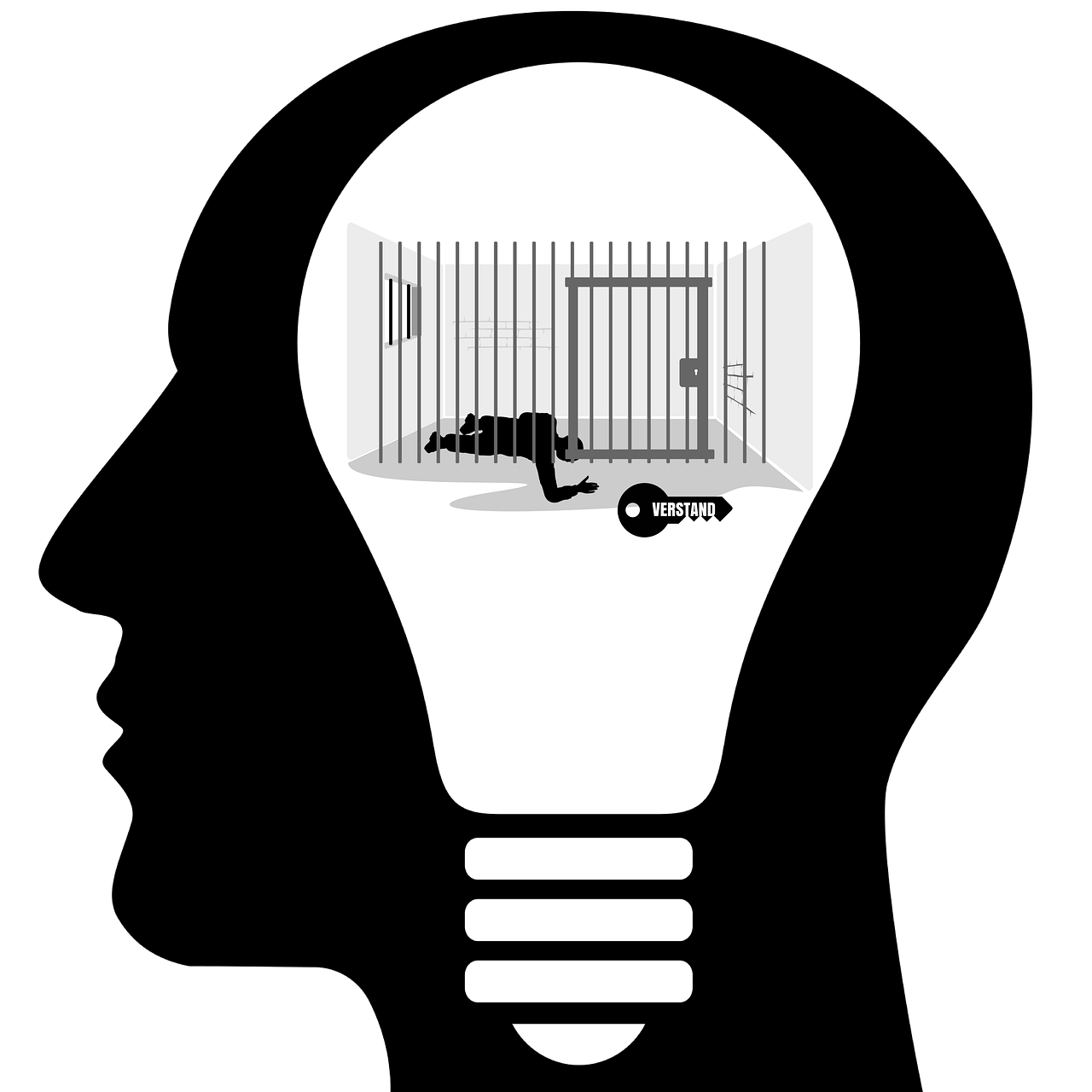
Kant's Influence on Modern Philosophy
Immanuel Kant's philosophy has had a profound and lasting impact on the landscape of modern thought. His ideas serve as a bridge between the rationalist and empiricist traditions, creating a paradigm shift that continues to resonate in contemporary discussions about knowledge, reality, and ethics. Kant's influence can be seen across various fields, including metaphysics, epistemology, ethics, and even political theory. By establishing a framework where reason and experience coexist, he opened the door for future philosophers to explore the complexities of human understanding.
One of the most significant aspects of Kant's influence is his challenge to the empiricist view that knowledge is solely derived from sensory experience. He argued that while our senses provide us with data, it is our rational faculties that interpret and give structure to that data. This idea has been pivotal in shaping modern epistemology, prompting philosophers to reconsider the roles of both reason and experience in the acquisition of knowledge. For example, the ongoing debates about the nature of scientific knowledge often reference Kantian principles, particularly the concept of a priori knowledge, which posits that certain truths exist independently of experience.
Moreover, Kant's categorical imperative has left a significant mark on ethical theory. His assertion that moral principles should be universally applicable has inspired numerous ethical frameworks and discussions. Philosophers such as John Stuart Mill and Friedrich Nietzsche have engaged with Kantian ethics, either by building upon it or by presenting critiques. This ongoing dialogue illustrates how Kant's ideas remain relevant, challenging thinkers to grapple with the implications of rationalism in ethics. The moral philosophy stemming from Kant has also influenced contemporary movements advocating for human rights and dignity, emphasizing the rational basis for moral actions.
In the realm of political philosophy, Kant's ideas about autonomy and freedom have shaped discussions around democracy and governance. His belief in the inherent worth of individuals and the importance of treating people as ends in themselves has influenced modern political thought, including theories of justice and human rights. The principles laid out in Kant's work have inspired movements that advocate for equality and liberty, demonstrating the far-reaching implications of his rationalist philosophy.
To illustrate Kant's enduring influence, consider the following table, which highlights key areas of modern philosophy that have been shaped by his ideas:
| Field | Kant's Contribution | Modern Implications |
|---|---|---|
| Epistemology | Reconciliation of rationalism and empiricism | Ongoing debates about the nature of scientific knowledge |
| Ethics | Categorical imperative and universal moral law | Influence on human rights and moral philosophy |
| Political Philosophy | Concept of autonomy and freedom | Foundations for democracy and justice theories |
In summary, Kant's influence on modern philosophy is both profound and multifaceted. His ability to synthesize various philosophical traditions has paved the way for ongoing discussions about the nature of knowledge, morality, and human rights. As we continue to explore these themes, it is clear that Kant's legacy will endure, prompting new generations of thinkers to engage with the questions he raised. His work invites us to consider not just what we know, but how we come to know it, and the ethical implications of our understanding.
- What is the main idea of Kant's philosophy?
Kant's philosophy centers on the idea that reason is the primary source of knowledge, bridging the gap between rationalism and empiricism. - How did Kant influence ethics?
Kant introduced the categorical imperative, which posits that moral actions should be universally applicable, greatly influencing modern ethical thought. - What is a priori knowledge in Kant's philosophy?
A priori knowledge refers to knowledge that is independent of experience, which Kant argued is essential for understanding certain truths. - Why is Kant considered a pivotal figure in modern philosophy?
Kant's synthesis of rationalism and empiricism, along with his contributions to ethics and political philosophy, has shaped contemporary philosophical discourse.

Legacy in Epistemology
Kant's contributions to epistemology have left an indelible mark on the landscape of modern philosophy. His revolutionary ideas about knowledge, perception, and the role of reason have reshaped how we understand the acquisition of knowledge. By establishing a framework that integrates both rationalism and empiricism, Kant created a bridge that has enabled philosophers to explore the complexities of human understanding in a more nuanced way. His work, particularly in the Critique of Pure Reason, challenges us to reconsider the very foundations of what we deem to be knowledge.
One of the most significant aspects of Kant's legacy is his introduction of the concept of a priori knowledge, which refers to knowledge that is independent of experience. This idea has sparked extensive debates and discussions among philosophers regarding the nature of knowledge itself. Kant argued that certain fundamental concepts, such as space and time, are not derived from experience but are instead inherent structures of human cognition. This perspective has led to a profound shift in epistemological discussions, prompting thinkers to explore the implications of innate knowledge and how it interacts with empirical data.
Moreover, Kant's notion of the categories of understanding has been pivotal in shaping epistemological thought. He posited that our experiences are filtered through these innate categories, which shape how we perceive reality. This idea has influenced various fields, including psychology, cognitive science, and even artificial intelligence, as researchers seek to understand the mechanisms of human thought and perception. The legacy of Kantian epistemology is evident in contemporary debates about the limits of human knowledge and the role of perception in shaping our understanding of the world.
To illustrate Kant's enduring influence, consider the following table that highlights key philosophers who have built upon his ideas:
| Philosopher | Contribution |
|---|---|
| Hegel | Developed the dialectical method, expanding on Kantian ideas of knowledge and reality. |
| Heidegger | Critiqued and reinterpreted Kant's ideas, particularly regarding being and existence. |
| Quine | Challenged the distinction between analytic and synthetic truths, influenced by Kant's framework. |
The implications of Kant's work extend beyond traditional epistemology; they also resonate within the realm of ethics. His moral philosophy, which emphasizes the role of reason in ethical decision-making, reflects his rationalist principles and has influenced contemporary discussions on moral relativism and universal ethics. By intertwining epistemology with ethics, Kant invites us to consider how our understanding of knowledge impacts our moral judgments and vice versa.
In conclusion, Kant's legacy in epistemology is not merely a historical footnote; it is a vibrant and ongoing dialogue that continues to shape our understanding of knowledge today. His ability to synthesize different philosophical traditions and challenge prevailing notions of knowledge has paved the way for future generations to explore the intricate relationship between reason, experience, and understanding. As we navigate the complexities of modern thought, Kant's insights remain a vital part of the conversation, reminding us that the quest for knowledge is both a personal and collective journey.
- What is a priori knowledge? A priori knowledge is knowledge that is independent of experience, such as mathematical truths.
- How did Kant influence modern philosophy? Kant's ideas challenged previous epistemological views and integrated rationalism with empiricism, influencing many later philosophers.
- What are the categories of understanding? These are innate concepts that shape our experiences and perceptions, according to Kant.

Ethics and Rationalism
Kant's approach to ethics is intricately woven into his rationalist framework, demonstrating how reason can serve as the foundation for moral principles. He believed that ethical behavior is not merely a matter of following societal norms or personal inclinations; rather, it is rooted in a universal law that can be discerned through rational thought. This is where Kant’s famous concept of the Categorical Imperative comes into play. Unlike hypothetical imperatives, which are contingent on personal desires, the Categorical Imperative commands us to act according to maxims that can be universally applied.
Imagine standing at a crossroads, faced with a decision that could impact not just your life but the lives of others. Kant would argue that the right choice is the one that could be willed as a universal law. If everyone acted in the same way, would the world be a better place? This thought experiment emphasizes the importance of rationality in ethical decision-making. Kant’s ethical framework encourages individuals to rise above personal biases and consider the broader implications of their actions.
Furthermore, Kant posited that humans are rational beings capable of making moral choices. This perspective assigns a profound dignity to individuals, as it suggests that we are not merely driven by instincts or external influences. Instead, we have the capacity to legislate moral laws for ourselves through reason. In this sense, Kantian ethics is empowering; it places the responsibility of moral judgment squarely on the shoulders of the individual.
To illustrate his ethical framework, Kant introduced the concept of autonomy, which refers to the ability to govern oneself through rational thought. Autonomy is crucial because it implies that moral agents are capable of recognizing their duties and acting upon them independently. This is a stark contrast to ethical theories that rely heavily on emotions or consequences. For Kant, the morality of an action is determined by the intention behind it, rather than the outcome it produces. This focus on intention is what makes his ethics distinctly rationalist.
In summary, Kant's rationalism profoundly influences his ethical philosophy by asserting that morality is grounded in reason. By advocating for the Categorical Imperative and emphasizing autonomy, he lays down a framework that encourages individuals to think critically about their moral choices. This rationalist approach not only shapes our understanding of ethics but also challenges us to consider the universality of our actions in a world where moral relativism often prevails.
- What is the Categorical Imperative?
The Categorical Imperative is a central concept in Kant's ethics, proposing that one should act only according to that maxim which one can will to become a universal law. - How does Kant's ethics differ from utilitarianism?
Kant's ethics focuses on the intention behind actions rather than the consequences, whereas utilitarianism evaluates actions based on the outcomes they produce. - What role does autonomy play in Kantian ethics?
Autonomy in Kantian ethics refers to the capacity of individuals to legislate moral laws for themselves through rational thought, emphasizing personal responsibility in ethical decision-making.
Frequently Asked Questions
- What is Kant's view on rationalism?
Kant believes that reason is the primary source of knowledge, fundamentally shaping our understanding of the world. He argues that while experience is important, it is our rational faculties that allow us to make sense of that experience.
- How does Kant reconcile empiricism and rationalism?
Kant presents a unique perspective by suggesting that both empiricism and rationalism play crucial roles in knowledge acquisition. He posits that while empirical data is essential, it is our rational mind that organizes and interprets that data, creating a comprehensive understanding.
- What is a priori knowledge in Kant's philosophy?
A priori knowledge refers to knowledge that is independent of experience. Kant argues that this type of knowledge is essential for understanding concepts like space and time, which are not derived from sensory experience but rather from our innate cognitive structures.
- What are the categories of understanding according to Kant?
Kant introduces several categories that help structure human experience, such as causality and unity. These categories are the lenses through which we perceive and interpret the world, shaping our knowledge and understanding of reality.
- How does Kant differentiate between intuition and sensibility?
Kant distinguishes intuition as the immediate awareness of objects, while sensibility refers to the capacity to receive sensory input. He argues that both play vital roles in knowledge formation, with intuition providing the raw data and sensibility allowing us to process and understand that data.
- What is the significance of Kant's "Critique of Pure Reason"?
Kant's "Critique of Pure Reason" is a foundational text that challenges traditional views of knowledge. He critiques previous epistemological frameworks and offers a new perspective on how we come to know things, which has had a profound impact on modern philosophy.
- How has Kant influenced modern philosophy?
Kant's ideas have significantly shaped contemporary philosophical discourse, influencing various fields such as epistemology, ethics, and metaphysics. His thoughts on the limits of human understanding and the role of reason continue to resonate with modern thinkers.
- What is Kant's legacy in epistemology?
Kant's contributions to epistemology are crucial, as he established a framework that still informs discussions about knowledge and belief today. His emphasis on the interplay between experience and reason has paved the way for future philosophical inquiry.
- How does Kant's rationalism extend into ethics?
Kant's rationalism is deeply intertwined with his moral philosophy. He argues that ethical principles are grounded in reason, suggesting that rational thought is essential for determining what is morally right or wrong.

